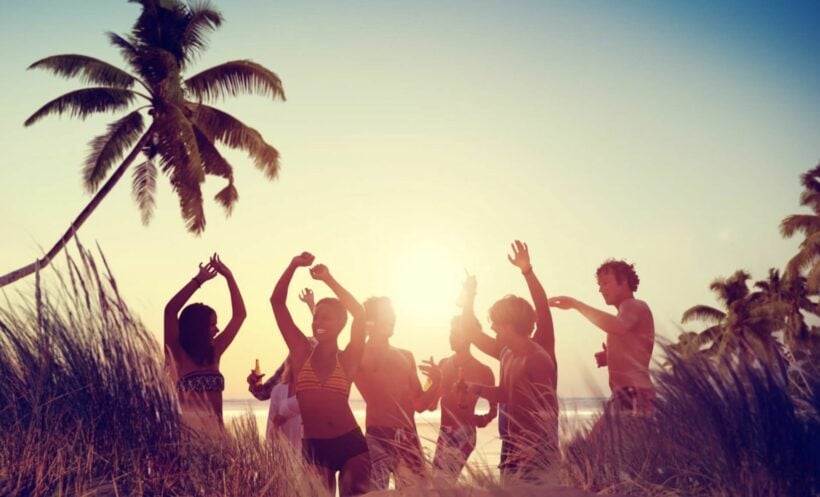Lights are out on Ibiza – the world’s party islands go dark

“The party scene, by its nature, is all about getting together, dancing, celebrating ‘closeness’ and being social – the antithesis of social distancing and staying away from other people in the Covid-era.”
Some of the world’s tourist islands are suffering badly from the lack of travel, it’s not just Bali and Phuket. The Spanish party island of Ibiza is also described as a “ghost town” at the moment without the tourists and the thump thump of the all night parties. It’s still summer season on Spain’s Balearic Islands, just off the coast of Valencia in the Mediterranean. If it wasn’t for a world pandemic, the party music would still be breaking the silence, with young Europeans stomping on the sandy beaches, bars and mega clubs of Ibiza. Instead, the islands remain quiet and devoid of tourists.
“There’s no tourism at all, now. Just a few people coming just for a few days. We had a very bad summer.Now we will have a very, very bad winter.” – Ibiza’s tourism director, Juan Miguel Costa.
But thanks to a summer of Covid quarantines, muted nightclubs and cancelled flights, the Balearic Islands are suffering from the worst hangover they’ve ever experienced. Now, the situation is prompting locals and businesses, who rely on income generated by the nightlife, to reconsider a future without it.
Ibiza has attracted celebrities arriving on superyachts, and planeloads of young British and German tourists looking for a good time. An underground dance party scene that started in the 1980s had matured into an internationally renowned tourism powerhouse. But, after re-opening in July with dancing banned, and no venues allowed to stay open past 2am, the world’s capital of clubbing took a huge hit.
The pandemic forced Ibiza’s larger venues to stay closed and it is feared that some may never reopen. The party is over for now as tourism officials try to reinvent the industry and focus on the island’s bohemian heritage, rather than its hedonistic party scene.
Even though some moderation of the excesses of the islands’ party scene were already on the cards, Covid-era restrictions put everything on hold. A series of laws designed to curb alcohol excess in the tourist hubs of San Antonio, Ibiza, Magaluf and Playa de Palma on Mallorca, including banning happy hours, party boats promoting drunken cruises and pub crawls, were introduced by the regional government at the start of the year. But the Balearic Islands never got to test drive the new party restrictions when the tourism was almost completely stopped.
Rosana Morillo, general director of tourism for the Balearic Islands, says that the current situation is being used to “reset” the island’s tourist industry and change the destination’s reputation. But others hope that the thumping, bumping nightclubs will return, but balanced along with other cultural highlights.
Like the world’s other party island destinations, the future of Ibiza lies in the balance. From Magaluf, Mallorca, just next door, to Ios and Santorini in Greece, Patong in Phuket, Hvar in Croatia and Kuta in Bali, the situation is similarly bleak. The world’s mood has moved from luxury and hedonistic travel breaks to focus on home, family, financial survival and work. And even when the travel bans lift, will the party islands be a priority in people’s Covid-era travel plans?
But the summer of 2020 wasn’t a total write off for the Spanish islands, even though northern Europe lockdowns and travel bans, particularly in Germany and the UK, kept most of their regular tourist traffic away. But by July, the introduction of travel corridors made weeks away in Spain, Greece and other European countries a possibility for UK travellers ready to run the gauntlet of a Covid-era flight. The Balaeric Islands managed to rack up 1 million visitors during July, still a long way from their usual tourist traffic but at least a promising start.
But, as has happened in numerous spots eager to re-open their doors, the situation changed quickly in the face of rising figures in some Spanish regions. The British government re-imposed a 14 day quarantine on all travellers returning from some countries, including Spain. Without much notice, travellers scrambled to get back home, and scheduled trips had to be cancelled. The German Foreign Office then advised against travel to Spain, etc, etc. Since the end of July the flow of travellers to the islands has been back to almost zero.
Now the lights are out in Ibiza’s mega clubs.
Around the world the plight of the most popular tropical island destinations is the same. In Thailand, both Koh Samui and Phuket face another challenge. Whilst the south East Asian country has been able to successfully suppress the ravages of Covid-19, the ongoing border ban means that its most popular island destinations, whilst absolutely safe and ready to accept tourists, are stuck in a Twilight Zone – no flights and no international tourist dollars.
But even if they opened, the ability for the world’s travellers to get to Thailand’s tropical destinations is hampered by a lack of flights. Even a pilot program to re-open Phuket to tourists from the start of October, has now been shelved. In both cases, the Thai islands are around 90% dependent of the tourist dollar.
Indonesia’s Bali started loosening restrictions in July, starting with a restart of on-island tourism then followed up with a reopening to domestic travellers. Before this Bali had had relatively few cases. At the start of August, Bali’s total Covid-19 cases stood at 3,448. That number has since nearly doubled as of yesterday, with 6,834 cases. The island’s chief of police said that the reopening of tourism across Bali “has resulted in a considerable number of young people going on excursions after months of being under quarantine”.
Costa Rica, not an island, but relying on tropical and party tourism, is taking a different approach. Despite a growing number of cases, (as of September 12, Costa Rica has 53,969 confirmed Covid-19 cases and 583 deaths) the government has decided to start gradually reopening for tourism, as Costa Rica’s economy is also very dependent on tourism. The island’s government has taken a very different approach to that of the Thai islands by opening up, despite the growing numbers of cases.
The party scene, by its nature, is all about getting together, dancing, celebrating ‘closeness’ and being social – the antithesis of social distancing and staying away from other people in the Covid-era. How the world’s party destinations pry open their doors and start the discs spinning again is a major challenge as health authorities and business owners struggle to strike a balance.
Latest Thailand News
Follow The Thaiger on Google News:


























